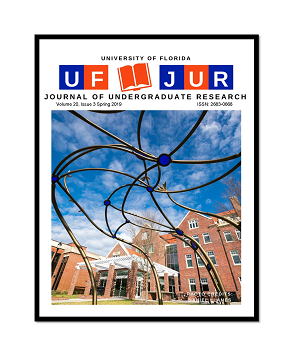Practitioner-Suggested Voluntary Psychiatric Hospitalization from a Feminist Therapy Perspective
DOI:
https://doi.org/10.32473/ufjur.v20i3.106241Keywords:
psychiatric hospitalization, feminist therapyAbstract
This study explores “practitioner-suggested voluntary psychiatric hospitalization,” or the gray area between voluntary and involuntary admission into psychiatric inpatient treatment where voluntary patients feel they have been persuaded into admission by practitioners with the authority to admit them involuntarily. Some scholars discuss this phenomenon in terms of power, indicating that what a practitioner views as a suggestion may be interpreted by a patient as coercion due to power imbalance within the psychiatric setting. However, research on how individuals with marginalized identities are affected by practitioner-suggested hospitalization is largely inconclusive. This study sought to address this gap by interviewing four feminist therapists, who focus on the intersections of social identities such as race, gender, and sexual orientation while promoting an egalitarian therapeutic relationship. The study discussed the experiences and opinions of feminist therapists and analyzed emerging themes.
References
Appelbaum, P. S. (1985). Empirical assessment of innovation in the law of civil commitment: A critique. Law, Medicine and Health Care, 13(6), 304-309.
Chamberlin, J. (1990). The ex-patients' movement: where we've been and where we're going. The Journal of Mind and Behavior,11(3/4), 323-336.
Curtis, A. (2001). Involuntary commitment. Retrieved from http://psychrights.org/states/Maine/InvoluntaryCommitmentbyAliciaCurtis.htm
Enns, C. Z. (2012). Feminist approaches to counseling. In E. Altmaier & J. Hansen (Eds.), Oxford handbook of counseling psychology (pp. 434-459). New York: Oxford University Press.
Gainesville Peer Respite. (n.d.). Retrieved from http://www.gainesvillerespite.org/
Gamble, V. N. (1997). Under the shadow of Tuskegee: African Americans and health care. American Journal of Public Health, 87(11), 1773–1778.
Gilbert, L. A. (1980). Feminist therapy. In Brodsky, A. M., Hare-Mustin, R. T., (Eds.), Women and psychotherapy (pp. 245–266). New York: Guilford
Gilboy, J. A., & Schmidt, J. R. (1971). Voluntary Hospitalization of the Mentally Ill [article]. Northwestern University Law Review, (4), 429.
Holstein, J. A. (1987). Producing Gender Effects on Involuntary Mental Hospitalization. Social Problems, 34(2), 141-155.
Langsworthy, D. (n.d.). Elizabeth Packard. Retrieved from http://www.mccarter.org/education/mrs-packard/html/4.html
Lidz, C. W., Mulvey, E. P., Arnold, R. P., Bennett, N. S., & Kirsch, B. L. (1993). Coercive interactions in a psychiatric emergency room. Behavioral Sciences & the Law, (3). 269.
Meyer, I. H. (2003). Prejudice, social stress, and mental health in lesbian, gay, and bisexual populations: Conceptual issues and research evidence. Psychological Bulletin,129(5), 674-697. doi:10.1037/0033-2909.129.5.674
Olfson, M., Wall, M., Wang, S., Crystal, S., Liu, S., Gerhard, T., & Blanco, C. (2016). Short-term suicide risk after psychiatric hospital discharge. JAMA Psychiatry,73(11), 1119. doi:10.1001/jamapsychiatry.2016.2035
Olofsson, B., & Jacobsson, L. (2001). A plea for respect: Involuntarily hospitalized psychiatric patients' narratives about being subjected to coercion. J Psychiatr Ment Health Nurs Journal of Psychiatric and Mental Health Nursing, 8(4), 357-366.
Olofsson, B., Gilje, F., Jacobsson, L. and Norberg, A. (1998), Nurses’ narratives about using coercion in psychiatric care. Journal of Advanced Nursing, 28: 45–53. doi:10.1046/j.1365-2648.1998.00687.x
Rader, J., & Gilbert, L. A. (2005). The egalitarian relationship in feminist
therapy. Psychology of Women Quarterly, 29(4), 427-435.
Rogers, A. (1993). Coercion and ‘voluntary’ admission: An examination of psychiatric patient views. Behavioral Sciences & the Law Behav. Sci. Law, 11(3), 259-267.
Roth, R. T., & Lerner, J. (1974). Sex-based discrimination in the mental institutionalization of Women. California Law Review, 62(3), 789
Testa, M., & West, S.G. (2010). Civil commitment in the United States. Psychiatry (Edgmont), 7: 30–40.
Downloads
Published
Issue
Section
License
Some journals stipulate that submitted articles cannot be under consideration for publication or published in another journal. The student-author and mentor have the option of determining which journal the paper will be submitted to first. UF JUR accepts papers that have been published in other journals or might be published in the future. It is the responsibility of the student-author and mentor to determine whether another journal will accept a paper that has been published in UF JUR.

